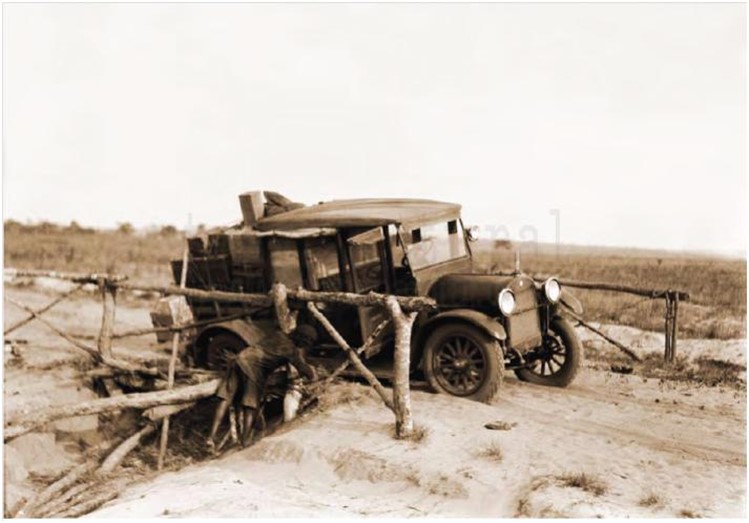PAST FUTURES: MICRO-HISTORIES OF DEVELOPMENT IN THE KAVANGO-ZAMBEZI TRANSNATIONAL REGION
Past Futures investigates the history of ‘future-making’ in the Kavango-Zambezi Transfrontier Area (KAZA), considering the history of rural development and the history of political schemes devised for the administration and control of the KAZA region. These histories have been deeply contested with KAZA, as rival external actors have sought to impose their own visions of the future upon the peoples of the KAZA, and as both movements of colonization and secessionism have challenged the sovereignty of the region. The project adopts a methodology that mixes archival research with the collection and analysis of oral histories.
Rural development programmes have been a prominent feature in the political economy of the region of the Kavango-Zambezi Transfrontier Area (KAZA) since the 1950s, although their character, extent, and aims have varied enormously. Through their policies for development, colonial and then post-colonial governments in this region sought to redefine patterns of land use, dictate the functioning of local social ecologies, and drive local thinking about future-making. The region has also been subject to ambitious political schemes to possess or redefine its sovereignty – involving secessionism, empire-building and radical schemes of ‘future-making’.
Past Futures will consider what impact the history of past political and economic development interventions now has upon the reception of and engagement with current initiatives in the region – and the Kavango-Zambezi Transfrontier Area (KAZA) that now binds five countries together in a shared scheme for land management and conservation development. Past, present, and future are linked through community experience of these past interventions: to know what future the rural communities of the KAZA imagine for themselves today, we must understand how their historical experience of past development has shaped their expectations. The project will draw upon case studies from Angola, Namibia, Botswana, Zambia and Zimbabwe, covering the period from 1890 to the present.
Past Futures is funded by the German Research Council (DFG), as part of Collaborative Research Centre 228, a joint programme of the University of Bonn and the University of Cologne. Research on this project began in January 2022, and archival research has already been conducted in Namibia, Zambia, South Africa, the USA and the UK. The project funding ends in December 2025. Four journal articles and book chapters are planned as the key outputs from the project, along with a monograph to be co-authored by Anderson and Jackson.
The Past Futures Project Team:

Prof. Dr. David M AndersonUniversity of WarwickPrincipal Investigator |
David M. Anderson is Professor in African History with the Global History & Culture Centre at the University of Warwick, and a Fellow of the British Academy. He also holds a visiting position as International Faculty Professor at the University of Cologne, where the Future Rural Africa collaborative research centre is located. He has published widely on the environmental and social history of eastern Africa, recently completing a project on hydro-histories and climate change influences in Kenya. His best-known publications include Eroding the Commons (2002), Histories of the Hanged (2005), and The Khat Controversy (2007), and his most recent book is Resistance, Protest and Rebellion in Kenya (in press, 2024). Since 2022, Anderson has been engaged in research on the history of the KAZA region in southern Africa, framed by the Past Futures project. |
Dr Kletus Likuwa, University of Namibia, Windhoek, Research Partner
|
Dr SISHUWA SISHUWAStellenbosh UniversityResearch Partner |
Sishuwa Sishuwa is a political historian of southern Africa since the twentieth century and Senior Lecturer in History at Stellenbosch University in South Africa. He has previously worked at the University of Cape Town and University of Zambia. His research mainly emphasises a historical approach to understanding contemporary political issues. Sishuwa is the author of Party Politics and Political Change in Zambia, 1955-2014 (James Currey, forthcoming). He has also published a series of articles on ethnicity, democracy, elections, civil society, populism, and “racialised nationalism and the rule of law” – for which he won the prestigious Terence Ranger prize from the Journal of Southern African Studies. Sishuwa serves on the editorial boards of the Journal of African History, the Journal of Southern African Studies, and the South African Historical Journal. He regularly contributes to the print and broadcast media on African politics, including to such outlets as CNN, BBC, Al Jazeera, eNCA, Newzroom Afrika, Mail & Guardian, The Washington Post, and The Guardian. Sishuwa obtained his DPhil in Modern History from the University of Oxford. Within the Past Futures project, Sishuwa will focus on the history of labour migration from Barotseland. |
|
Dr JONATHAN M. JACKSONUniversity of ColognePost-doctoral Researcher |
Jonathan M. Jackson is a Postdoctoral Research Fellow at the University of Cologne, where he works with the Collaborative Research Centre (CRC) ‘Future Rural Africa’, and an Academic Visitor at the African Studies Centre, University of Oxford. He completed his BA in History & Swahili at SOAS, before taking an MSc in African Studies at the University of Oxford. His doctoral thesis was completed at Cologne in 2021. His current research on Past Futures focuses on the central part of the KAZA region, especially the history of Barotseland (Western Province, Zambia). He has undertaken fieldwork in Tanzania, Namibia, and in Zambia, and is engaged in archival research throughout the southern African region, as well as in the UN archives (in New York) and the British colonial archives (in London). Jackson has already published on the Past Futures project, and his monograph, Visions for a Valley, about the history of rural development in Kilombero, Tanzania, is now in press. Further articles, on the KAZA region, are now being prepared. |
|
Dr LUREGN LENGGENHAGERUniversity of ColognePost-doctoral Researcher |
Luregn Lenggenhager is a historian with a focus on environmental humanities, multi-species historiographies, conservation, land and border studies in Namibia and southern Africa. He is currently a DAAD Prime Research Fellow, with a postdoc at the Global South Studies Centre, University of Cologne. Lenggenhager received his PhD from the University of Zurich. He has published on the history of militarization and conservation, transfrontier conservation and land questions in southern Africa. He organizes regular academic exchange programs between Namibia and Switzerland. His current research, “The Elephant and the Tsetse Fly: Animal crossings in a Southern African borderland, c.1920-2000” investigates how changing (post-)colonial borders interact and redefine species boundaries, conviviality and hierarchies. Luregn currently holds Visiting Research Fellowships at the Global History and Culture Centre, University of Warwick, and at the Okavango Research Institute of the University of Botswana. He has been collaborating with the Past Futures team in archival research, and will participate in publications from this project. |
|
KAYLA BROWNUniversity of WarwickGraduate Research Associate |
Born in South Africa, Kayla Brown recently graduated in History at the University of Warwick, where she studied the history of the Cold War in Africa and wrote her honours dissertation on the legacies of black soldiers in apartheid South Africa’s military. Kayla’s keen interest in African histories and politics has secured her a role as a Research Analyst at London Politica, where she examines current events and macro trends on the continent. In her role as a Graduate Research Associate on Past Futures, Kayla has been identifying and translating Afrikaans-language archival sources on the development of the South African Defence Force’s presence in the Caprivi Strip and the backlash they received from the Caprivi African National Union. Kayla will also collaborate in publication from the project. |
|
KYLE MELLESUniversity of WarwickGraduate Research Associate |
A recent Distinguished Military Graduate in History from Washington University, St Louis, Missouri, Kyle Melles now holds a prestigious Fulbright Scholarship and is based at Warwick’s Global History and Cultural Centre for 2023-24. Under the auspices of the ‘Past Futures’ project, he has been preparing his undergraduate dissertation for publication – a study of ‘future-making’ in late-colonial Kenya that looks at the continuities of security legislation into the post-colonial period. Kyle is now working on the themes of sovereignty, claim-making, and legal matters between colonial states concerning boundaries in the KAZA region, using colonial archival sources. Publications will be prepared from this work over the coming months. His broader research interests include colonial constitution-making, security legislation, legal theory, and post-colonial developments over eastern and southern Africa.
|
Recent publication –
Kennedy Mkutu Agade, David M. Anderson, Klerkson Lugusa and Evelyne Atieno Owino (2022). ‘Water Governance, Institutions and Conflicts in the Maasai Rangelands’, Journal of Environment and Development, Online First (September 2022)
FILM
During the summer, a documentary film was made based on my research. I was consultant and writer on the programme. Rogan Productions made the film, and it was shown on Channel 4, in the Secret Histories series, on Sunday 14 August 2022. The film is entitled A Very British Way of TortureLink opens in a new window. The film was widely reviewed, and received overwhelmingly favourable comments – even from those newspapers that you might think would oppose such a film. In early November, the film will also be shown on Al Jazeera Investigates, and after that it will be available internationally online.

Recent and Forthcoming project activities
3-5 July 2024, Past Futures: New Histories From Southern Africa, a Work-in-Progress Workshop, Southern Sun Ridgeway Hotel, Lusaka. Supported by THUTO KE THEDE, University of Cologne, UNAM, University of Warwick and University of Zambia
18 January 2024. David Anderson will present a seminar on ‘South African imperialism and Caprivi’, at the African Studies Centre, Leiden University, The Netherlands.
In December 2023, David Anderson and Kyle Melles will undertake archival research at the South African National Archive in Pretoria, and at the South African Defence Archive in Irene.
In December 2023, Jono Jackson will undertake archival and field research in Zambia.
7-8 December 2023. David Anderson will participate in a research workshop, at the University of Jena, on 'Emergency Mindsets: On the History of States of Exception’. He will present a paper entitled The Evolving Arts of Emergency Powers under British Rule, 1919-1998.
3 November 2023. The Past Futures project will host a Work-in-Progress Workshop on the theme of 'Past Futures: New Histories from Southern Africa'. To be held at the Wolfson Research Exchange, in the Main Library at the University of Warwick, from 10.30 am to 6 pm, on Friday 3 November, this workshop will feature presentations from all of the project team, alongside other invited speakers who will include Simukai Chigudu, Miles Tendi, Diana Rodriguez Cala and Romi Nghitevelekwa.
20 October 2023. Luregn Lengennhager and David Anderson will both participate in the 10th Annual 'Researching Namibia Day', hosted by the Basler Afrika Bibliographien, in Basel, Switzerland. Anderson will present a paper on 'The politics of decolonization and the future of Caprivi Zipfel, c.1956-66'.
From late September through October Jono Jackson will undertake archival research in Windhoek, Lusaka and Livingstone, and will conduct fieldwork around Katima Mulilo and in Barotseland.





